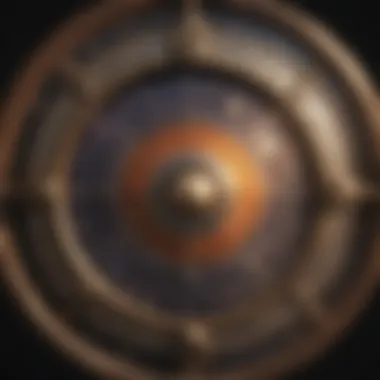Exploring the Depths of Predictive Astrology


Intro
Predictive astrology, a fascinating branch of the astrological tradition, requires an understanding of various celestial influences. It is distinct in its approach when compared to natal astrology, which focuses on an individual's birth chart. Instead, predictive astrology looks ahead, identifying significant periods that may bring about change in a person's life.
The principles underlying this practice are deeply rooted in the movement of celestial bodies, particularly the planets. While some may view astrology as an art, it also possesses scientific elements through its reliance on calculations, cycles, and patterns observed in the universe.
This examination aims to break down the fundamental components of predictive astrology and elucidate its relevance in contemporary life. By diving into the methodologies employed by astrologers, we will also highlight how this approach can facilitate personal development.
Understanding the Zodiac
Overview of Zodiac Signs
The zodiac consists of twelve signs, each offering distinct energetic patterns. These patterns influence personalities, interactions, and life trajectories.
- Aries
- Taurus
- Gemini
- Cancer
- Leo
- Virgo
- Libra
- Scorpio
- Sagittarius
- Capricorn
- Aquarius
- Pisces
Sign Traits and Characteristics
Each zodiac sign is associated with specific traits. For example, Aries may be seen as bold and impulsive, while Taurus tends to be more grounded and stable. Understanding these characteristics can provide insight into how individuals may respond during various transits and progressions.
Elemental Qualities
The signs are also categorized based on four elemental qualities: fire, earth, air, and water.
- Fire signs (Aries, Leo, Sagittarius) are driven by passion and enthusiasm.
- Earth signs (Taurus, Virgo, Capricorn) emphasize practicality and reliability.
- Air signs (Gemini, Libra, Aquarius) thrive on intellect and communication.
- Water signs (Cancer, Scorpio, Pisces) connect deeply with emotions and intuition.
These elemental forces play a role in shaping not only individual characteristics but also the nature of interactions between people during key astrological events.
Astrological Insights
Current Astrological Trends
Astrologers often analyze the positions of the planets in relation to the signs during significant periods. Current transits provide insights into collective energies and themes that influence everyday life. Understanding these trends helps in recognizing potential opportunities and challenges.
Influence of Celestial Events
Celestial events, such as eclipses and retrogrades, hold significant weight in predictive astrology. Each event brings with it unique energies. For instance, a solar eclipse may signify new beginnings, while a Mercury retrograde often prompts introspection and revisiting past matters.
How to Interpret Your Birth Chart
A birth chart provides a personal snapshot of the sky at the moment of one's birth. Understanding how to interpret this chart can yield valuable insights into personality traits and life paths. Key factors to consider include:
- The position of the Sun, Moon, and rising signs.
- The aspects formed between planets.
- The houses in which the planets reside.
Horoscope and Predictions
Monthly or Weekly Forecasts
Many astrologers provide forecasts based on the current planetary positions. These forecasts often highlight notable themes for the upcoming month or week, aiding individuals in preparing for significant events and decisions.
Personalized Horoscope Reading
A personalized horoscope reading incorporates one's individual birth chart. This type of analysis allows for a more nuanced perspective on how current transits impact specific areas of life, such as career, relationships, or health.
Compatibility Readings based on Zodiac signs
Understanding compatibility based on zodiac signs adds another layer to relationships. Analyzing dynamics can provide insight into strengths and potential challenges, facilitating more harmonious interactions.
"Astrology is a tool for self-discovery and personal development, guiding individuals through the cycles of life."
By combining the principles and techniques discussed, one can gain a comprehensive understanding of predictive astrology. The insights derived from these practices can serve as a valuable guide in navigating life's uncertainties.


Understanding Predictive Astrology
Predictive astrology serves as a nuanced framework for interpreting future events based on celestial movements. This aspect of astrology transcends mere fortune-telling; it offers profound insights for personal development and decision-making. By exploring the principles underlying predictive astrology, readers can gain a refined understanding of their life’s trajectory, enhancing awareness of potential challenges and opportunities.
Definition and Scope
Predictive astrology can be defined as the branch of astrology that seeks to forecast potential events and circumstances in a person's life through celestial phenomena. It encompasses various techniques that astrologers use to interpret the positions and movements of celestial bodies.
The scope of predictive astrology extends beyond individual horoscopes. It includes the study of transits, progressions, and specific timing methods that reveal when particular life events may unfold. Recognizing these aspects helps individuals understand how planetary influences might alter their lives at various stages.
Historical Background
The practice of predictive astrology is not a modern creation but has roots in ancient civilizations. Babylonian astrologers, around 2,000 BCE, laid the groundwork for later astrological practices. They observed celestial cycles and made predictions based on consistent patterns. Greek philosophers like Ptolemy further developed these ideas, codifying them for future generations.
Over centuries, predictive astrology evolved. Various cultures, including the Mesopotamians, Egyptians, and later, the astrologers of the Renaissance, contributed to its transformations. Each era added layers to the understanding of planetary influences, making predictive astrology a rich tapestry woven from diverse traditions.
Key Differences from Natal Astrology
While both predictive and natal astrology are vital components of astrological practice, they serve distinct functions. Natal astrology focuses on an individual’s birth chart—essentially a snapshot of the sky at the moment one is born. It provides insight into personality traits, strengths, and challenges.
In contrast, predictive astrology examines how these natal influences manifest over time and how they can be affected by transiting planets. To pinpoint certain events, predictive astrology utilizes the birth chart as a foundation but looks forward, anticipating changes.
There are essential differences that set predictive astrology apart:
- Focus: Natal astrology is retrospective, while predictive astrology is prospective.
- Technique: Predictive techniques (like transits and progressions) apply to existing natal charts to project future events.
- Purpose: The primary goal of predictive astrology is to prepare individuals for the future, offering strategies for navigating potential life fluctuations.
In summary, understanding predictive astrology enriches an individual’s grasp of astrology as a whole. It enables better personal navigation and fosters self-awareness, ultimately enhancing the journey of life.
Core Techniques in Predictive Astrology
Predictive astrology utilizes various techniques to guide individuals in understanding future trends and events. These methods are crucial for astrologers and those interested in personal development. By analyzing the movements of celestial bodies, practitioners can gain insights into possible life events and personal growth.
Solar and Lunar Returns
Solar and lunar returns provide key insights into the astrological year ahead. A solar return chart is created when the sun returns to its exact position at the moment of an individual’s birth. This chart outlines themes and potential experiences for the upcoming year. Understanding the placements of planets in this chart can offer guidance on areas such as career, relationships, and personal challenges.
In contrast, the lunar return chart focuses on the moon's return to its natal position. It occurs every month, illuminating shorter-term influences and emotional dynamics. Astrologers often use these tools for setting intentions and preparing for significant events. The nuanced differences between solar and lunar returns enhance an individual's understanding of time and impact.
Transits
Transits are one of the most widely utilized techniques in predictive astrology. They refer to the ongoing movements of planets in relation to one’s natal chart. Each planet represents specific energies and influences; thus, understanding their positions throughout time can foretell significant changes in a person's life.
For example, a strong transit from Jupiter, known for its expansive qualities, may suggest opportunities and growth, while a challenging aspect from Saturn might indicate hardships or lessons. It is essential for practitioners to evaluate these dynamics carefully, as transits can either encourage or hinder growth. Analyzing current transits against the backdrop of the natal chart forms a comprehensive understanding of potential future events.
Progressions
Progressions involve moving the natal chart forward in time, typically one year for every day after birth. This technique reveals how personal energies evolve. The most common method is the secondary progression, which focuses on the movement of the sun, moon, and planets past their natal positions.
These progressed positions often reflect internal developments and changing perspectives over time. Understanding progressions allows individuals to become aware of their evolving identity and motivations. It highlights how life experiences can change their approach toward challenges and ambitions.
Timing Techniques
Astrological timing techniques involve determining the best moments for action, decision-making, or even introspection. Timing can greatly influence the effectiveness of one’s efforts. Techniques such as electional astrology are commonly used to find optimal times for significant undertakings—be it launching a business, starting a relationship, or moving to a new place.
Additionally,(astrologers also rely on planetary hours and days to assess the most propitious times for tasks. Each planet resonates with specific influences, which can be harnessed for certain types of actions. This precision enhances the likelihood of achieving desired outcomes.
Conclusively, mastering these four core techniques in predictive astrology equips practitioners with a robust toolkit. As these methods are employed together, they offer both depth and breadth in astrological interpretation, ensuring a well-rounded approach to understanding life's rhythms and cycles.
Astrological Tools and Resources
Astrological tools and resources are integral for anyone practicing predictive astrology. They not only assist astrologers in calculating celestial positions but also aid in interpreting various astrological elements. Familiarizing oneself with these tools enhances the accuracy and depth of one's readings. Such resources facilitate a better understanding of complex astrological charts, which are essential for making informed predictions. This segment examines three important tools: the Ephemeris, astrological software, and online calculators.
Ephemeris Usage


An ephemeris is a table or data resource that details the positions of celestial bodies at specified times. This tool is crucial for predictive astrology as it provides historical data critical for forecasting future trends based on past planetary movements. Utilizing an ephemeris helps astrologers to locate planetary positions for any given date and thus to analyze transits and progressions accurately.
Astrologers often use an ephemeris in the following ways:
- Identifying planetary transits: These indicate how current celestial movements affect an individual's natal chart, hence influencing various life events.
- Understanding retrograde periods: Recognizing when planets are retrograde is vital for assessing potential challenges in one’s life.
- Planning significant events: Knowing favorable planets' positions can aid in scheduling events with more auspicious energies.
Astrological Software
Astrological software has transformed how practitioners approach astrology. Modern software is designed to automate calculations that would otherwise require extensive manual work, increasing both efficiency and precision. Many programs offer advanced features, such as chart visualization, interpretation assistance, and customization options.
The benefits of editing predictive astrology charts through software include:
- Enhanced accuracy: Automated calculations minimize human error, leading to more reliable readings.
- Chart interpretations: Many programs analyze factors like transits and progressions, giving insights in a matter of seconds.
- User-friendly interfaces: These allow both beginners and experienced astrologers to explore astrology without steep learning curves.
Popular software options among astrologers include AstroSeek and Solar Fire, both known for their comprehensive features.
Online Calculators and Tools
The advent of online tools and calculators has made predictive astrology more accessible. These resources simplify calculations often needed for astrological interpretations. Many websites feature free tools that cover various aspects of predictive astrology—from basic natal calculations to complex predictive methods.
Some advantages of using online calculators include:
- Instant results: Calculating planetary positions, lunar phases, and more can be done quickly without extensive background knowledge.
- Ease of use: Many online calculators are designed to guide the user, minimizing errors and complexity.
- Access to community feedback: Websites often have forums or discussion boards like those found on reddit.com, where users can share experiences or ask for advice based on the readings generated by the tools.
Interpreting Predictive Astrology Charts
Interpreting predictive astrology charts is crucial for gaining insights into upcoming life events and psychological shifts. By analyzing these charts, astrologers can identify patterns and trends that reflect an individual's potential experiences. This analysis serves as a reliable guide in navigating life’s uncertainties. Understanding predictions drawn from these charts allows one to align their actions and intentions with favorable cosmic energies.
Interpreting Transits
Transits are a foundational element in predictive astrology. They occur when planets move in relation to an individual’s natal chart, triggering events and personal transformations. Each transit carries a unique energy influenced by the nature of the planets involved. For example, a Saturn transit typically indicates a period of hard work and potential challenges, while a Venus transit may suggest a time of increased social interactions and relationships.
Astrologers interpret these transits to forecast significant shifts. During such periods, themes related to the transiting planet's characteristics become prevalent. An astrologer needs to consider the natal house affected by the transit and aspects formed with natal planets. This dual approach helps to illuminate possible developments in different areas of life such as career, romance, or personal growth.
Analyzing Progressions
Progressions serve as another powerful technique in predictive astrology. Specifically, secondary progressions move the natal chart forward in time, often revealing growth and internal changes. Each day after birth represents a year in an individual’s life. Therefore, analyzing these progressions provides insights into one’s evolving psyche; insights can assist in understanding emotional shifts and life phases.
Astrologers look at progressed planets and key angles such as the Ascendant. Significant progressions often align with major life events, including career changes, relocations, or personal transformations. It is essential to evaluate these movements in conjunction with transits, resulting in a more comprehensive narrative of life stages and self-discovery.
Integrating Various Techniques
Integrating various predictive techniques enriches the interpretation process. A proficient astrologer must combine insights from transits, progressions, and timing techniques for a more holistic understanding. For instance, when a critical transit occurs, checking the progressed chart can confirm if that transit's influence resonates with personal development.
This synthesis not only clarifies predictions but also strengthens the applicability of astrology in daily life. Astrologers can highlight possible outcomes and advise on appropriate actions based on various astrological methods. Ultimately, the integration of these approaches empowers individuals, enabling them to make informed choices aligned with their inherent predispositions.
"A thorough understanding of predictive astrology charts not only informs us about the future but also encourages personal awareness and accountability."
The art of interpreting predictive astrology charts thus serves as a bridge to self-awareness and conscious living, offering depth and insight into our existential journey.
Astrology as a Tool for Personal Growth
Astrology offers a unique lens through which individuals can examine their personal development. By unveiling the underlying motivations and tendencies in one's life, astrology can serve as a powerful tool for self-awareness, decision-making, and relationship dynamics. It helps individuals understand their strengths, weaknesses, and patterns, providing a framework for personal growth that is grounded in the celestial movements.
Self-Awareness Through Astrology
Astrology encourages profound self-exploration. By analyzing natal charts, individuals can discover their inherent traits and tendencies. Each planet and sign in a natal chart provides insight into various aspects of one's personality. For example, the placement of the Moon can indicate emotional responses, while Mercury can shed light on communication styles. This self-awareness is crucial in recognizing habits that may hinder growth.
A key benefit of self-awareness through astrology lies in developing self-acceptance. Recognizing personal strengths allows individuals to embrace these traits. Conversely, understanding weaknesses can guide individuals toward self-improvement. Therefore, astrology is not merely a reflection but a pathway to enhanced personal clarity.
Making Informed Decisions


Astrology offers invaluable insights when it comes to making choices in life. By examining transits and progressions, individuals can identify favorable periods for significant endeavors, such as career shifts or relationship commitments. This allows for a more calculated approach to decision-making, minimizing regrets and uncertainty.
Moreover, utilizing predictive astrology can assist people in aligning their choices with their intrinsic values and goals. For example, if a Jupiter transit suggests abundance, one might feel empowered to pursue new opportunities. Such awareness can also mitigate feelings of anxiety surrounding life-changing decisions, as individuals can recognize that certain energies support their actions.
Building Relationship Awareness
The insights gained from astrology extend far beyond personal growth; they enhance relational dynamics as well. Relationship astrology examines compatibility based on the natal charts of partners. Understanding how each person’s energies interact can illuminate areas of harmony and catalyze discussions about potential challenges.
“Astrology is a science that can unveil the nuances of interpersonal connection.”
In addition to compatibility, astrology also fosters empathy and patience in relationships. Recognizing that differing emotional responses or communication styles stem from astrological placements can equip individuals with the tools to navigate conflicts. By practicing this understanding, individuals cultivate a healthier and deeper connection with those around them, ultimately leading to stronger relationships.
Astrology, therefore, offers immense potential for personal growth. Through self-awareness, informed decision-making, and relational insight, individuals can navigate their life's journey with greater clarity and purpose. This astrological framework not only enriches individual lives but also enhances the collective experience as deeper awareness fosters understanding among all.
Contemporary Perspectives on Predictive Astrology
In the modern era, predictive astrology has evolved significantly. Understanding the contemporary perspectives is crucial for grasping how this practice integrates into the daily lives of individuals and communities. Many seek predictive astrology not only to gain insights about their future but also to utilize it for personal growth, decision-making, and relationship management. In this section, we'll explore various angles, including eclectic approaches, skepticism and criticism, and the cultural variations that continue to shape predictive astrology.
Eclectic Approaches
The eclectic approaches in predictive astrology reflect the blending of various astrological currents and philosophies. Modern practitioners often combine traditional techniques with newer methodologies. Some might integrate Western astrology with elements from Vedic traditions or even incorporate aspects of numerology and tarot. This fusion allows astrologers to cater to diverse client needs and preferences.
- Holistic Practices: Many practitioners adopt holistic perspectives, enabling them to use predictive astrology as a part of a broader self-help or therapeutic practice.
- Multiple Tools: Utilizing tools like solar returns and progressions together ensures richer readings.
- Personalization: Clients often appreciate personalized readings that consider their unique situations rather than a one-size-fits-all model.
This eclectic nature emphasizes adaptability in modern astrology, encouraging practitioners to draw knowledge from various schools of thought.
Skepticism and Criticism
Despite the growing interest, skepticism and criticism around predictive astrology remain prevalent. Many detractors question the empirical validity of astrological claims, arguing that predictions lack scientific backing. This perspective often emphasizes critical thinking and requires practitioners to justify their methods to more analytical audiences.
Some critics propose that reliance on astrology can lead to fatalism, suggesting that individuals may feel they have limited control over their futures. Awareness of these critiques is essential for practitioners as it fosters honest, informed discussions with clients.
"Being aware of skepticism allows astrologers to better communicate their insights and navigate conversations about their practice."
Cultural Variations and Adaptations
Astrology, in its various forms, is often influenced by cultural variations and adaptations. Different cultures interpret and practice astrology in unique ways. For instance, while Western astrology focuses on individual charts, Chinese astrology involves animal signs and cycles of time, fundamentally shifting the interpretative lens.
- Local Practices: Indigenous practices often combine astrology with spiritual philosophies.
- Regional Changes: Adaptations such as the rise of digital astrology in the age of social media have made astrology more accessible and varied globally.
- Community Engagement: Today, many modern astrologers participate in online communities, sharing insights and interpretations that evolve continuously based on cultural interactions.
The ability to adapt predictions and practices to fit cultural contexts enhances the relevance of predictive astrology in a rapidly changing world.
The Future of Predictive Astrology
Predictive astrology continues to evolve, responding to changes in society and technology. As practitioners and enthusiasts explore new frontiers, several elements and considerations will shape its future. Understanding these aspects is essential not only for astrologers but also for clients who seek clarity and guidance in their lives. The adaptability of predictive astrology allows it to remain relevant, providing insights into personal growth and societal changes.
Emerging Trends
The landscape of predictive astrology is shifting due to a variety of emerging trends. One noteworthy trend is the growing popularity of tailor-made readings. Astrologers use personalized methods to provide individualized insights, emphasizing unique aspects of their clients' lives. This personal touch often encourages deeper connections between astrologers and seekers.
Another trend involves a more systematic approach to predictive techniques. Integrative methods combining different astrological systems can yield richer interpretations. Both traditional and modern methods are increasingly used together, enhancing the depth of analysis and catering to a wider audience. Clients are often looking for a comprehensive understanding of their astrological influences, not just limited to a single perspective.
The integration of social media platforms has also played a role in shaping the future of predictive astrology. Astrologers can now connect with global audiences, sharing insights and fostering discussions on platforms like Facebook and Reddit. This shift allows practitioners to reach new clients while also learning from their peers.
Integrating Technology
Technology plays a crucial role in the future of predictive astrology. Software and applications are streamlining calculations and analyses, allowing astrologers to focus more on interpretations rather than computations. Tools like TimePassages and AstroSeek are examples of technologies that assist both beginners and experienced astrologers in performing in-depth analyses quickly.
Furthermore, online workshops and webinars have become popular. These allow astrologers to share knowledge and collaborate, regardless of geographic boundaries. Clients can also benefit from online consultations, making services more accessible. Emerging technologies such as artificial intelligence may offer further enhancements, allowing for deeper predictive capabilities and more personalized experiences.
Potential for New Discoveries
As predictive astrology continues to develop, there is considerable potential for new discoveries. Ongoing research into celestial phenomena and their influences may lead to improved methodologies. For example, the study of planetary retrogrades and their specific effects on various life areas is a field ripe for exploration.
Astrologers can look for connections between astrological events and historical trends. Understanding how these cycles repeat or evolve could lead to insights about societal movements and personal experiences. This analytical approach could create a more robust framework for predictions, making the practice more credible.
As predictive astrology becomes more refined, the collaboration between different schools of thought will be essential. Interdisciplinary studies involving psychology, sociology, and even physics may yield significant advancements. Astrologers who embrace these collaborations might find themselves at the forefront of fresh revelations that enhance both predictive techniques and the understanding of astrology as a whole.
"The practice of astrology should not only predict but also serve as a map for navigating life's complexities and opportunities."







